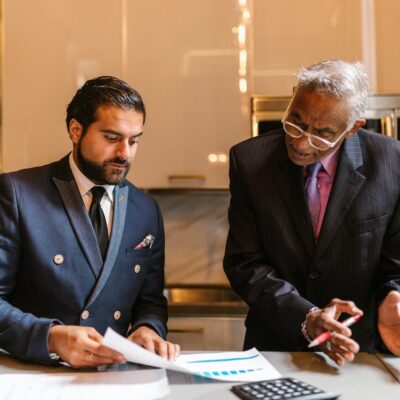Atlanta Dangerous Property Wrongful Death Attorney
Pursuing Justice and Restitution for Your Loss
In Atlanta, Georgia, we expect the places where we live, work, and visit to be safe, but preventable hazards like crumbling stairs or poor security often lead to avoidable tragedies. When a property owner ignores basic maintenance or safety measures to save money, the consequences can be devastating for families. Losing a loved one is hard enough, but knowing their death could have been prevented by a simple repair or better lighting makes the loss even more painful. An Atlanta dangerous property wrongful death lawyer can help families pursue justice and compensation.
If you’re grieving a loss caused by a property owner’s negligence, you have the right to seek justice and compensation for things like funeral costs and emotional distress. Navigating a legal claim against big management companies and insurers is difficult, but you don’t have to do it alone. Our Atlanta wrongful death lawyer is here to handle the investigation and hold the responsible parties accountable. Fill out the form below to share your story and see how we can help your family move forward.
Get Free Case Evaluation!
Fill out the form below to schedule a free consultation. All our cases are handled on a contingency basis, so you do not pay us until we win.
Common Causes of Dangerous Property Wrongful Deaths in Georgia
Slip and Fall Hazards
Inadequate Security Measures
Fire Safety Violations
Elevator and Escalator Malfunctions
Toxic Exposure
Falling Objects
Immediate Steps Following a Fatal Dangerous Property Incident in Georgia
When you suspect wrongful death, prompt and deliberate actions are critical to protect your legal rights and establish a foundation for accountability. Our wrongful death attorneys recommend the following steps:
- Secure Official Documentation Promptly: Ensure law enforcement or regulatory agencies document the incident, detailing property conditions, hazards, and contributing factors. For instance, a fire marshal’s report on a blaze can pinpoint code violations. This documentation is a cornerstone of your case, and your attorney will assist in obtaining copies swiftly.
- Preserve Evidence at the Scene: If safe and permissible, photograph the hazardous condition such as a broken railing, slick floor, or unsecured gate. Collect contact information from witnesses who observed the incident or prior complaints about the property. Avoid tampering with the scene to maintain evidence integrity.
- Restrict Communications with Property Owners or Insurers: Property managers or insurers may offer condolences or settlements that undervalue your loss. Statements made in grief can be misconstrued to weaken your claim. Politely decline discussions until your attorney is involved to safeguard your position.
- Document Pertinent Details: Record interactions with property staff, emergency responders, or investigators, noting dates, names, and any admissions of fault, such as a manager acknowledging prior hazard reports. Maintaining a log of your emotional and financial burdens funeral costs or lost income can further illustrate the incident’s impact.
- Engage an Atlanta Wrongful Death Attorney Expeditiously: The complexity of premises liability claims, combined with strict deadlines, demands immediate legal consultation. Your attorney will gather evidence like maintenance logs, building permits, or safety inspections to prove negligence and pursue restitution.
- Initiate Legal Proceedings Accurately: Your counsel will draft a wrongful death petition, outlining the property owner’s negligence, the causal link to the fatality, and your resulting damages, ensuring compliance with legal standards for a seamless process.
- Remain Engaged with Professional Support: Collaborate with your attorney as they navigate investigations and negotiations, allowing you to focus on healing while they advocate relentlessly for justice.
Why You Need a Dangerous Property Wrongful Death Attorney
Pursuing justice after a fatal dangerous property incident is a challenging experience, as property owners and their insurers often employ aggressive tactics to evade liability. The following factors underscore the critical need for a qualified wrongful death attorney:
- Establishing Negligence: Proving a property owner’s failure to maintain safe conditions requires detailed analysis. Your attorney partners with safety experts to identify breaches, such as ignored repairs or inadequate security measures.
- Rebutting Defensive Strategies: Defendants may argue the deceased was trespassing or negligent. Your counsel counters with compelling evidence, like visitor logs or prior complaints, to keep liability focused on the property owner.
- Optimizing Restitution: Your attorney quantifies immediate and long-term losses, including lost support and emotional harm, and seeks exemplary damages for gross negligence, ensuring comprehensive recovery.
- Navigating Legal Complexities: Premises liability involves nuanced standards, like duty of care variations for invitees versus trespassers. Your attorney ensures adherence to all legal requirements to fortify your claim.
- Proving Causal Nexus: Linking the hazard to the fatality demands robust evidence. Your counsel builds a clear narrative, using inspection records or expert testimony to defeat objections.
- Adhering to Statutory Deadlines: Georgia’s filing constraints are rigid. Your attorney acts decisively to preserve your claim’s viability under Georgia Code § 9-3-33.
- Alleviating Client Burden: By managing evidence collection, insurer negotiations, and potential litigation, your attorney frees you to prioritize personal recovery while they secure justice.
Why Trust Our Wrongful Death Lawyers?
Focused Experience
Client-Centered Approach
Proven Results
No Upfront Fees
Comprehensive Investigations
Trial-Ready Advocacy
Speak to a Dedicated Wrongful Death Lawyer today!
Our attorneys handle all forms of wrongful death cases throughout Georgia. We’re only dedicated to wrongful death claims and lawsuits, ensuring you receive thorough attention and care during your time of grief. Do not wait any longer to speak to an attorney. Fill out the form below to schedule a free consultation. All our cases are handled on a contingency basis, so you do not pay us until we win.Settling vs. Going to Trial: What Families Should Know
After filing a wrongful death claim, families often wonder whether they should settle or go to trial. Both paths have important implications, and our role is to guide you toward the best decision based on your unique situation.
When a Settlement Might Be the Best Option:
- Faster Resolution: Settlements can resolve cases much more quickly than trials, allowing families to find closure sooner.
- Privacy: Settlements are private agreements, sparing families from public court proceedings.
- Reduced Emotional Strain: Trials can be emotionally taxing; settlements avoid putting families through extended litigation.
- Guaranteed Outcome: A settlement ensures you receive compensation, whereas trials come with uncertainties.
When Going to Trial May Be Necessary:
- Insurance Companies Offer Lowball Settlements: If the defense refuses to offer fair compensation, a trial may be necessary.
- Gross Negligence Needs Public Accountability: Some families choose trial to hold negligent parties publicly accountable.
- Disputed Liability: If the other side disputes responsibility for your child’s death, a trial allows evidence and witnesses to be presented before a judge or jury.
Our Atlanta wrongful death attorneys will always prioritize what’s best for your family by negotiating fiercely when possible, but ready to fight in court when justice demands it.
Compensation for Dangerous Property Wrongful Death Claims Under Georgia Law
While no financial award can restore your loved one, restitution under Georgia law mitigates economic hardship and formally acknowledges the deep personal toll of your loss. Comprehensive recovery encompasses both tangible and intangible damages, ensuring your family’s stability. The following categories are available:
- Funeral and Burial Expenses: Costs for memorial services, caskets, cremation, or headstones can be substantial, adding strain during an already difficult time. These expenses are compensable, ensuring that honoring your loved one’s memory does not deepen your financial burden. Our attorneys compile detailed documentation receipts, contracts, and invoices to secure full reimbursement, verifying each expense for accuracy.
- Medical Expenses Incurred Prior to Death: If your loved one received emergency treatment following the incident such as trauma care, surgeries, or hospitalization these costs are recoverable under Georgia Code § 51-4-5. Examples include ambulance fees, intensive care, or diagnostic tests. Your counsel cross-references billing statements with medical records to ensure every charge is accounted for, preventing discrepancies that insurers might exploit.
- Loss of Earnings and Economic Support: Your loved one’s income, benefits, or household contributions often underpinned your family’s financial security. Compensation covers immediate lost wages and extends to projected lifetime earnings, retirement plans, health insurance, or non-monetary support like caregiving or home repairs. Economic experts may calculate these losses, factoring in career trajectory, inflation, and regional wage trends to present a thorough valuation to the court, ensuring your family’s future is protected.
- Loss of Consortium and Companionship: The emotional void left by a spouse, parent, or child is profound and enduring. Damages for loss of consortium address the absence of love, guidance, mentorship, and shared experiences, whether a partner’s companionship, a parent’s nurturing, or a child’s potential. Your attorney collaborates with you to convey this loss through personal testimonies, family videos, letters, or documented milestones, ensuring the court grasps the relational devastation.
- Emotional Distress and Suffering: The psychological impact of grief, anxiety, depression, or diminished quality of life constitutes a significant injury. Restitution for emotional distress validates your pain, acknowledging sleepless nights, fractured family dynamics, and the challenge of facing anniversaries without your loved one. Your counsel may incorporate psychological evaluations, therapy records, or personal journals to quantify this suffering, advocating for substantial recovery that reflects your lived experience.
- Punitive Damages for Egregious Conduct: In cases of willful or reckless negligence such as a property owner ignoring repeated hazard reports or disabling safety systems, punitive damages may be pursued under Georgia Code § 51-12-5.1 to penalize and deter. Your attorney proves intentional misconduct, leveraging evidence like internal memos or whistleblower accounts to justify these awards, ensuring accountability extends beyond compensation to prevent future tragedies.
Statutory Limitations for Filing in Georgia
Georgia law imposes stringent temporal constraints on initiating a dangerous property wrongful death claim, necessitating proactive engagement to preserve your legal remedies. A clear understanding of these deadlines is essential to avoid forfeiture of your rights:
- Two-Year Limitation Period: Claims must be filed within two years from the date of the decedent’s death, as mandated by Georgia Code § 9-3-33. For a fatality on August 1, 2025, the deadline is August 1, 2027, with few exceptions, emphasizing the need for swift action.
- Commencement from Date of Death: The limitation period begins at the moment of passing, not the incident itself, offering clarity but requiring prompt response, even if the hazardous condition’s impact was delayed.
- Exceptions to the Standard Period: Tolling may occur in rare circumstances, such as when the claimant is a minor under Georgia Code § 9-3-90 or when the defendant conceals liability through fraud, as permitted under Georgia Code § 9-3-96. Your attorney conducts a rigorous review to assess applicability, though such extensions demand compelling substantiation and are not guaranteed.
- Preservation of Evidence Through Prompt Action: Timeliness extends beyond statutory compliance. Maintenance logs may be discarded, security footage overwritten, or witness recollections faded. Filing early ensures access to critical evidence such as repair requests, building code violations, or incident reports which may otherwise be lost, strengthening your case’s foundation.
- Consequences of Non-Compliance: Failure to file within the prescribed period extinguishes your claim, regardless of its strength. Insurers may exploit delays, anticipating missed deadlines to avoid liability. Your counsel acts decisively, coordinating evidence collection and expert consultations to submit within the permissible window.
- Coordination with Related Claims: If the estate seeks separate damages, such as for medical expenses before death, these claims also adhere to the two-year limit. Your attorney aligns all filings to prevent conflicts, ensuring comprehensive recovery without procedural missteps.
Who Can File a Wrongful Death Claim in Georgia?
Georgia law delineates a precise hierarchy of individuals permitted to pursue a wrongful death action, ensuring those most affected by the loss have the authority to seek redress. The eligible parties include:
- Surviving Spouse: The spouse holds primary filing rights, acting for themselves and any minor children, with the responsibility to distribute damages equitably among dependents. Your attorney ensures compliance with this allocation to protect all interests.
- Children of the Deceased: In the absence of a spouse, the decedent’s biological or adopted children may initiate the claim. Multiple children may collaborate, and your counsel facilitates coordination to streamline representation.
- Parents of the Deceased: If no spouse or children survive, the parents are authorized to file. In cases of separation or disagreement, legal nuances may arise, which your attorney resolves to maintain claim integrity.
- Estate Administrator or Executor: Lacking immediate family, the estate’s representative may pursue the action under Georgia Code § 51-4-5, with recovery allocated to the next of kin per statutory succession. Your counsel navigates probate complexities to appoint a suitable representative.
What Clients Say About Our Firm
Rebecca Harris
- Wrongful Death
Scott Smithwick
- Personal Injury
Debendra Deba
- Wrngful Death
Lauren Sulkis
- Wrongful Death
Kaiser Reed
- Wrongful Death
Denver Camden
- Wrongful Death
How to Choose the Best Wrongful Death Lawyer in Atlanta
Choosing the best Wrongful Death Lawyer is crucial to ensuring you receive the justice and compensation your family deserves. The lawyer you select will guide you through the complex legal process and help you determine whether to settle or go to trial based on your unique circumstances.
Key Factors to Consider When Choosing a Wrongful Death Lawyer:
- Experience with Wrongful Death Cases: Ensure the lawyer specializes in wrongful death cases, particularly those involving infants, as they require a unique approach and deep understanding of medical and product liability issues.
- Track Record of Success: Look for a lawyer with a proven history of securing favorable verdicts and settlements in similar cases. Their success rate is a strong indicator of their ability to handle complex claims effectively.
- Compassion and Sensitivity: Infant wrongful death cases are emotionally charged. Your lawyer should demonstrate empathy, offering you the emotional support and understanding you need during this difficult time.
- Willingness to Go to Trial if Necessary: While many cases settle, some need to be fought in court. A strong lawyer will not back down if it’s in your best interest, especially if the defendant is offering an unfair settlement.
- Clear Communication and Transparency: Your lawyer should keep you informed at every stage, explaining the legal process in a way that’s easy to understand. They should also provide honest assessments of the case, including the potential outcomes.
By choosing the right wrongful death lawyer, you ensure that your family’s case is handled with the respect, expertise, and dedication it deserves, giving you the best chance at securing justice and closure.
Procedure for Initiating a Wrongful Death Claim
Commencing a dangerous property wrongful death claim demands a disciplined and strategic approach, integrating investigative precision with legal expertise to construct a robust case. The procedural framework includes:
- Verification of Claimant Eligibility: Confirming your legal authority to file is the foundational step, ensuring alignment with Georgia’s claimant hierarchy to preempt procedural challenges that could derail the claim.
- Retention of Specialized Counsel: Engaging an attorney with expertise in premises liability and wrongful death litigation is paramount. Your counsel evaluates the case’s merits, identifying actionable breaches such as failure to repair a known hazard or neglecting security protocols and outlines a tailored strategy to pursue accountability.
- Comprehensive Evidence Acquisition: Your attorney assembles an extensive evidentiary portfolio, encompassing maintenance records, property inspection reports, incident logs, photographs of the hazard, and witness statements. Safety experts, structural engineers, or code compliance specialists may be consulted to elucidate violations, such as unaddressed building defects or non-compliance with Georgia Code § 44-7-13 for landlord duties, forming the claim’s backbone.
- Compliance with Statutory Deadlines: Adherence to the two-year filing limitation under Georgia Code § 9-3-33 is non-negotiable. Your counsel calibrates the timeline to submit well in advance, allocating sufficient preparation to avoid errors while ensuring robust case development.
- Preparation of the Legal Petition: The filing document articulates the property owner’s duty of care, the specific breach (e.g., failure to fix a collapsing structure), the causal link to the fatality, and the resultant damages. Your attorney ensures precision and compliance with procedural mandates, such as proper notification of defendants, to forestall dismissal.
- Substantiation Through Expert Testimony: Experts in building safety, fire codes, or criminology clarify complex issues for the court, such as the foreseeability of harm from an unsecured gate or the consequences of neglected repairs. Your counsel selects authoritative professionals whose credentials withstand scrutiny, reinforcing the claim’s credibility.
- Negotiation or Litigation for Resolution: Many claims resolve through settlement, but trial readiness is essential to counter insurer resistance. Your attorney engages defendants with evidence-backed demands, rejecting inadequate offers with resolve. Should litigation prove necessary, they advocate vigorously in court, presenting a compelling case to secure equitable restitution.
Establishing Liability in a Wrongful Death Claim
Securing a favorable outcome in a dangerous property wrongful death action hinges on satisfying four essential legal elements, each substantiated through rigorous evidence and expert analysis. The requisite components are:
- Duty of Care: The property owner’s obligation to maintain safe conditions varying by the deceased’s status as an invitee, licensee, or trespasser must be established. For invitees, like shoppers or tenants, the duty is highest, requiring reasonable care to prevent harm, as outlined in Georgia Code § 51-3-1. Documentation, such as lease agreements or event invitations, anchors this element.
- Breach of Duty: Evidence must demonstrate that the owner failed to address a known or foreseeable hazard, such as ignoring a reported gas leak or neglecting broken lighting. Maintenance records, prior complaints, or safety violation citations are pivotal in proving negligence, showing the owner’s inaction despite awareness.
- Causation of Fatality: The breach must be directly linked to the death, a complex task given potential defenses like third-party interference. Your attorney uses forensic reports, coroner’s findings, or expert reconstructions to establish causation for instance, showing how a faulty elevator caused a fatal fall, countering arguments of unrelated factors.
- Quantifiable Damages: The claim must enumerate tangible and intangible losses, including economic impacts like lost income and non-economic harms like emotional distress, under Georgia Code § 51-4-2. Comprehensive documentation pay stubs, funeral invoices, family testimonies, or mental health records ensures a holistic valuation, capturing the full scope of your loss.
- Adherence to Evidentiary Standards: All evidence must conform to judicial requirements for admissibility, per Georgia Code § 24-14-1. Your counsel curates credible materials, from surveillance footage to expert depositions, ensuring procedural compliance to withstand defense challenges.
- Timely Filing: Submission within the statutory limitation period is critical, with no exceptions absent extraordinary circumstances. Your attorney coordinates efforts to meet this threshold without compromising case quality, ensuring timely filing.
- Neutralization of Defenses: Defendants may allege the deceased’s negligence, such as ignoring warning signs. Your counsel refutes such claims with factual rebuttals, leveraging Georgia Code § 51-11-7 (comparative negligence) to minimize their impact and preserve your recovery.
Speak with a Wrongful Death Lawyer Today!
Location
Drop Us a Line
Trust us to represent your families best interest throughout Georgia.
Locations We Serve in Georgia
We proudly serve families throughout Atlanta and across Georgia. In Atlanta, we assist clients in areas such as Downtown (30303), Midtown (30308), Buckhead (30305), Old Fourth Ward (30312), Inman Park (30307), West End (30310), Virginia-Highland (30306), Peachtree Heights East (30327), Grant Park (30315), and Chastain Park (30342). We also represent clients in cities like Marietta (30060), Roswell (30075), Sandy Springs (30328), Alpharetta (30004), Lawrenceville (30046), Gwinnett (30043), Augusta (30901), Savannah (31401), Columbus (31901), and Athens (30601). No matter where you are in Georgia, we’re here to provide expert legal support for your wrongful death case.









